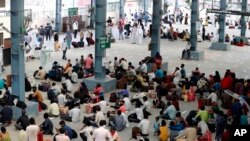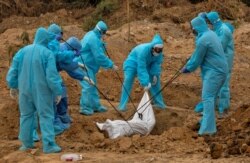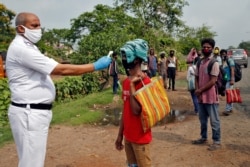India has launched the biggest evacuation of its citizens in decades, deploying aircraft and navy ships to bring home thousands of Indians stranded in foreign countries after it shut its borders and stopped all international commercial flights in March due to COVID-19.
The operation is being carried out amid growing appeals from migrant workers, students and visitors overseas to be brought home amid lockdowns and restrictions imposed across countries battling the coronavirus pandemic.
Their return poses a fresh challenge to India as it grapples with a surge in coronavirus cases -- health experts say the country’s stringent six-week lockdown has not slowed the pace of infections, which now number nearly 53,000.
Sixty-four flights will operate over the next week to bring back about 15,000 Indians from a dozen countries, including, the Maldives, United States, Britain, Singapore and Middle Eastern countries.
Two flights from the cities of Abu Dhabi and Dubai are scheduled to land late Thursday in India’s southern state of Kerala, from where millions of Indian workers travel to work in Middle East countries. Some migrant workers said they need to come back after losing jobs in the wake of the economic disruption caused by the pandemic.
A naval ship, meanwhile, reached the Maldives to evacuate about 1,000 Indians, many of whom had been working in its now battered tourism industry. Another naval ship will reach there later this week.
Eventually, India plans to bring back about 200,000 citizens in what has been billed by local media as the biggest evacuation exercise since it airlifted 170,000 Indians from Kuwait during the 1990 Gulf War.
Civil Aviation Minister Hardeep Puri said the massive exercise is meant to help citizens who are stranded and in distress. “Many of them have visas, which have expired, some of them are to be deported,” he told India Today. “We will take all safeguard measures that can possibly be taken to ensure that risk is minimized.”
The coronavirus infection initially arrived in the country from Indians who had traveled overseas – the first case was a student who came home from the city of Wuhan, China where COVID-19 was first detected late last year.
Health authorities have mandated that all those returning will have to undergo screening and remain in quarantine for two weeks, either in hospitals or a government facility. The crews will wear protective gear, while all passengers will have to wear masks and follow social distancing norms.
India’s lockdown, which has been partially eased in recent days as it tries to get the country’s economy back on track, is due to end on May 17. Authorities have not yet said when international flights will resume.
However, the country has added new cases at record highs in recent days – Wednesday’s tally of 3,600 cases was the biggest so far. Health experts point out that the surge is coming from a handful of places in the country, such as the financial capital, Mumbai, which has emerged as the biggest hot spot, accounting for nearly one-fifth of the country’s total cases.
Calling Maharashtra state, where Mumbai is located, an area of particular concern, Health Minister Harsh Vardhan has offered to assist state health officials. “The government is ready to help in every way possible -- be it manpower increase, capacity building, technical assistance or any kind of handholding that is required to manage the situation.”






